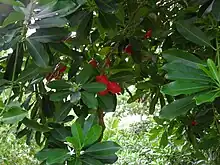
Carbazole, parent compound of the carbazole alkaloids

Foliage leaves and fruits of Ochrosia elliptica

Fruits of Glycosmis pentaphylla
The carbazole alkaloids are natural products of the indole alkaloid type, derived from carbazole.[1]
Occurrence
Carbazole alkaloids with unsubstituted benzene rings occur rarely. Olivacin has been found in the bark of Aspidosperma olivaceum and ellipticin in Ochrosia elliptica.[2] Some carbazole alkaloids, especially glybomin B, have been isolated from Glycosmis pentaphylla.[3]
Representatives
Representatives include, among others, glycozoline, olivacine and ellipticin[2] and further glybomine B.[3]
 Glycozoline
Glycozoline Olivacine
Olivacine Ellipticin
Ellipticin Glybomine B
Glybomine B
Properties
Carbazole alkaloids have cytotoxic and antifungal properties. Furthermore, they have detrimental effects against HIV viruses and tumor cells.[3] Olivacin has fluorescent properties.[2]
References
- ↑ Entry on carbazole alkaloids. In: Römpp Online. Georg Thieme Verlag, accessed May 31, 2020.
- 1 2 3 Eberhard Breitmaier (1997), Alkaloide, Wiesbaden: Springer Fachmedien, p. 49, ISBN 978-3-519-03542-8
- 1 2 3 G. Yang, Y. Wu, Y. Chen (2012), "Alkaloids from the Stems of Glycosmis pentaphylla", Helvetica Chimica Acta, vol. 95, no. 8, pp. 1449–1454, doi:10.1002/hlca.201200027
{{citation}}: CS1 maint: multiple names: authors list (link)
External links
Wikimedia Commons has media related to Carbazole alkaloids.
This article is issued from Wikipedia. The text is licensed under Creative Commons - Attribution - Sharealike. Additional terms may apply for the media files.